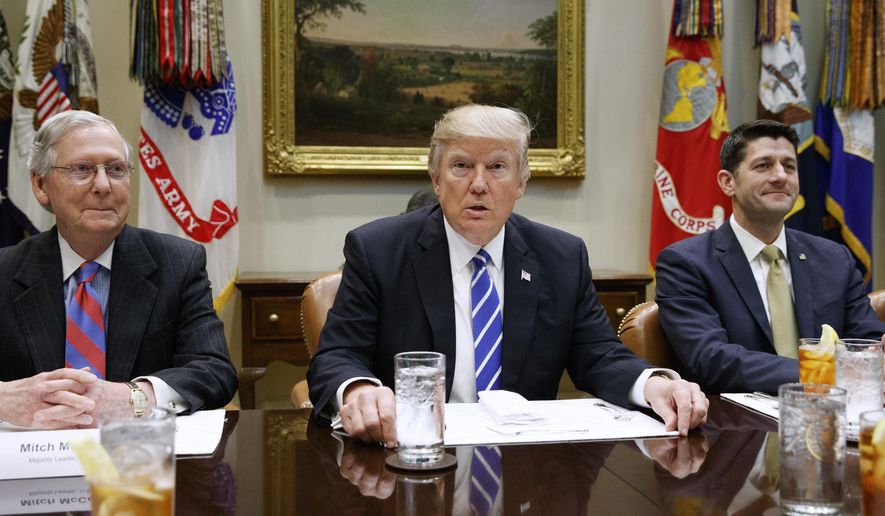President Trump may cancel Congress’ summer recess and demand that lawmakers stick around through August to force Democrats to confirm more of his nominees, the White House said Monday, throwing down a challenge to senators who have tried to obstruct him at nearly every turn.
Democrats have mounted filibusters on 90 percent of the president’s picks that have reached the Senate floor — much higher than the 10 percent rate that Republicans mounted for President Obama’s, the White House said.
Republicans said it is the worst treatment of any president’s nominees in modern political history.
“The president has every right to call Congress back if necessary,” said Marc Short, the White House director of legislative affairs.
The blockade began the day Mr. Trump took office and has continued for the ensuing six months.
Democrats’ explanations have varied. They initially blamed paperwork problems, then cited questions surrounding the president and Russia, and now say they are upset at the way Republicans are handling the health care debate.
Mr. Short said the blockade is jeopardizing national security, denying Americans a fully staffed federal government and grinding other legislation to a halt.
“Democrats even walked out of committee hearings to deny quorums, like schoolchildren taking their toys from the playground,” he said. “But it is the American people who are being hurt.”
Mr. Trump has announced 216 nominations for civilian positions. The Senate has confirmed fewer than 50.
Mr. Obama had won more than 310 of his 454 nominees from January to the end of July in 2009.
Ever more striking is the Democrats’ fight against every nomination that reaches the floor. Though Republicans have the votes to confirm the nominees, thanks to Democrats’ triggering of the “nuclear option” rules change in 2013, Democrats are forcing Republicans to tick off extra procedural boxes, using up floor time.
Those objections work out to a 90 percent obstruction rate, the White House said — far greater than the 10 percent rate Mr. Obama faced.
The White House’s threat to cancel the August recess could be a way to reclaim some of that time.
Mr. Short pinned the blame on Senate Minority Leader Charles E. Schumer, saying the New York Democrat had “run an unprecedented campaign of obstruction.”
Mr. Schumer’s office responded by saying that the White House has only itself to blame for vacant administrative posts.
“Thus far, the nomination process has been defined by the failure of the Trump administration to submit names for hundreds of vacant jobs, incomplete and delayed ethics and nominations paperwork from the nominees themselves, and repeated withdrawals of nominees for key positions,” Mr. Schumer’s office said in a statement. “If the White House is looking for someone to blame, they ought to look in a mirror.”
Indeed, Mr. Trump has submitted about half as many nominations to the Senate as Mr. Obama at the same point in his presidency. But that does not explain the slow pace of votes on the names Mr. Trump has submitted.
Mr. Schumer cited about 26 of Mr. Trump’s nominations that he said were held up because of paperwork delays.
When combined with those who have been confirmed, that still leaves an unexplained backlog of about 140 nominees.
Just three of 19 nominees for posts at the Justice Department have been approved, the White House said. Still waiting are key posts such as the solicitor general.
Presidents George W. Bush and Clinton had confirmation rates of 70 percent or better at this point in their tenures, according to a Washington Times analysis of data from the Congressional Record.
On Monday, Republicans confirmed Neomi Rao to be director of the office of information and regulatory affairs at the White House Office of Management and Budget. Democrats had mounted a filibuster on her in June, a week after attempting to filibuster Kristine L. Svinicki to be a member of the Nuclear Regulatory Commission and Marshall Billingslea to be assistant secretary for terrorist financing at the Treasury Department.
The White House highlighted the backlog of nominees with three weeks remaining before Congress’ monthlong recess, a summer vacation that lawmakers are loath to give up.
The White House also wants significant progress in its stalled legislative agenda before lawmakers leave Capitol Hill, including getting a health care bill passed by the Senate and a tax reform bill ready.
“I cannot imagine that Congress would dare to leave Washington without a beautiful new HealthCare bill fully approved and ready to go!” Mr. Trump tweeted Monday.
Nominees who have won approval have occasionally suffered through an agonizing process. Before he was confirmed as attorney general in a party-line vote, former Sen. Jeff Sessions was dragged through accusations of racism and bigotry.
Mr. Trump’s most prized nominee, Judge Neil Gorsuch for the Supreme Court, succeeded only after the Republican majority resorted to the “nuclear option,” which changed Senate rules to end filibusters for nominees to the high court.
• S.A. Miller can be reached at smiller@washingtontimes.com.




Please read our comment policy before commenting.